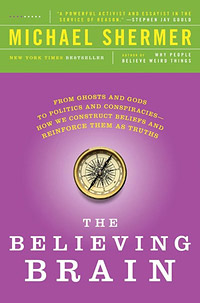Why there cannot be a deity beyond the natural world
that science can discover
On Saturday, November 3, 2012 I spoke at the big atheists’ conference in Mexico City on The Believing Brain, my latest book in which I develop a theory to explain not just why people believe weird things, but why people believe anything at all, including and especially god beliefs. (I don’t know if the talk will be posted Online but it is an expanded version of my TED talk or this longer version.
In the audience was the biologist Jerry Coyne, the author of one of the best defenses of evolutionary theory ever penned: Why Evolution is True. He posted a blog about my lecture in which, surprisingly (given his staunch militancy for atheism), he expressed a difference with me in the possibility of there being a God. He writes:
While I respect Shermer’s view that invoking aliens or some unknown explanation avoids a “god of the gaps” argument for unknown and miraculous or divine phenomena, I still feel as a scientist that the existence of a true supernatural god is a theoretical possibility, and that there is some possible evidence that could convince me of it. (I’ve described that evidence before; needless to say, none has been found.) Yes, such miraculous evidence for a god might eventually be found to be due to aliens or the like, but my acceptance of a god would always be a provisional one, subject to revision upon further evidence. (We might find aliens behind the whole thing.) After all, every scientific “truth” is provisional.
Jerry’s allusion to alien gods is in reference to my brief summary in the Q&A of what I originally proposed in a 2002 Scientific American column entitled “Shermer’s Last Law” (title written with tongue firmly in cheek because naming laws after oneself is a sure sign of crankdom): “Any sufficiently advanced extra-terrrestrial intelligence is indistinguishable from God.”
Readers will recognize this as a variant of Arthur C. Clarke’s Third Law: “Any sufficiently advanced technology is indistinguishable from magic.” I expanded on that column in my god chapter in The Believing Brain to address the claim by both theists and atheists that god’s existence is an empirical matter open to verification or refutation. I contend that it is not. Both Richard Dawkins (in The God Delusion) and Victor Stenger (in God: The Failed Hypothesis—How Science Shows that God Does Not Exist) have claimed as much in their books, and I believe that this is what Jerry Coyne means as well. My argument is that the most any natural science could ever discover in the way of a deity would be a natural intelligence sufficiently advanced to be god-like but still within the realm of the natural world. As I wrote in Scientific American:
God is typically described by Western religions as omniscient and omnipotent. Since we are far from the mark on these traits, how could we possibly distinguish a God who has them absolutely, from an ETI who has them in relatively (to us) copious amounts? Thus, we would be unable to distinguish between absolute and relative omniscience and omnipotence. But if God were only relatively more knowing and powerful than us, then by definition it would be an ETI!
The logic of this gambit is relatively simple:
- Biological evolution progresses at a glacial pace compared to scientific and technological evolution.
- The cosmos is very big and space is very empty, so the probability of making contact with an ETI who is only slightly more advanced than us is virtually nil. If we ever do find ETI it will likely be hundreds of thousands or millions of years more advanced than us.
- Apply Moore’s Law of the doubling of computing power every year to technology in general (as Ray Kurzweil has done in his book The Singularity is Near), and then imagine an extra-terrestrial civilization a million years more advanced than us. If in a mere century we went from crude rockets to manned-space flight, and from plant-breeding genomics (Gregor Mendel) to the creation of artificial genomes (J. Craig Venter), imagine what an extra-terrestrial intelligence could do in a million years of scientific and technological R&D?
- What would you call an entity a million years more technologically advanced than we are? If you don’t know the technology behind it you might call it a god, if you do you would correctly identify it as a sufficiently advanced extra-terrestrial intelligence.
On the matter of the supernatural, Jerry Coyne continues in his blog:
As always, I find the natural/supernatural distinction confusing, and see that it is possible in principle for some divine being who operates outside the laws of physics to exist. To say there is no possibility of such a thing is an essentially unscientific claim, since there is nothing that science can rule out on first principles. We rule out things based on evidence and experience, that is, we consider the possibilities of gods extremely unlikely since we have no good evidence for them. But it is close-minded to say that nothing would convince us otherwise.
I disagree. It is simply a matter of what philosophers of science call methodological naturalism, or the process of employing only natural explanations for natural phenomena. Science operates in the natural, not the supernatural. In fact, I go so far as to say that there is no such thing as the supernatural. There is just the natural and mysteries we have yet to explain by natural causes. Invoking such words as “supernatural” (and, in other realms, the “paranormal”) just provides a linguistic place-holder until we find natural causes (or we do not find them and discontinue the search out of lack of interest). I often employ the example of how cosmologists talk about “dark energy” and “dark matter” in reference to the so-called “missing mass” needed to explain the structure and motion of galaxies and galaxy clusters—they do not use these words as causal explanations. The words themselves are just linguistic place holders until the actual forms of matter and energy are discovered and described.
Similarly, when people use the word “mind” they tend to reify it into something that exists up there in the head in addition to the brain. It doesn’t, but let’s say I’m wrong and the “paranormalists” are right that consciousness exists separate from the brain in, perhaps, a quantum state, and that when your neurons fire they are capable of influencing the neurons in someone else’s head, and thus mind-reading or ESP is real. That would no longer be something “paranormal”; instead, it would be entirely within the realm of normal science—quantum neuroscience perhaps.
What Jerry Coyne (and, presumably, Richard Dawkins and Victor Stenger) is open-minded about is the possibility of a new and as yet undiscovered natural entity or force at work in the cosmos capable of creating, say, universes, stars, planets, and living beings (Freeman Dyson, Michio Kaku, and science fiction writers have speculated for years on how sufficiently advanced ETIs could create planets, stars, and even universes—it’s all really just an engineering problem to be solved).
A supernatural entity or force (something like the God of Abraham) that exists outside of nature is, by definition, unknowable to science. By contrast, if a supernatural being reaches into our natural world in order to act on it, He must stir the particles in some way (to, say, answer prayers for healing a cancerous tumor by reconfiguring the DNA of the cancerous cells, or to help one nation win a war over another by redirecting bullets and bombs, or to aid one football team defeat another in the Superbowl by deflecting a touchdown pass), and that action must in principle be measurable by science. If it is not measurable even in principle, then it is not knowable by science.
As correctly noted by Mssrs. Coyne, Dawkins, and Stenger, no such particle stirring (or stirrer) has been detected by scientists. But by the logic of Shermer’s Last Law, the only God that science could discover would be a natural being—an entity that exists in space and time and is constrained by the laws of nature. A supernatural God that exists outside of space and time and never interacts with our world is not knowable to science.
Q.E.D.



